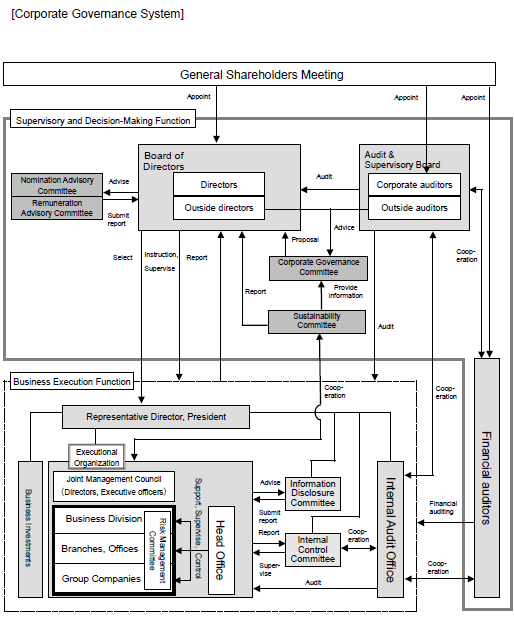
Basic Policy and Guidelines regarding Corporate Governance
Basic Views on Corporate Governance
To remain a company that is trusted by society, based on the principles of respecting the rights of shareholders, ensuring management fairness and transparency, and maintaining self-discipline centered on the Board of Directors, the Company sufficiently fulfills its duties of fiduciary responsibility and accountability to shareholders. At the same time, the Company positions corporate governance as a high-priority management issue for realizing Our Hopes for the Future (Purpose) and has as its basic policy firmly establishing a corporate governance system based on diverse perspectives and long-term objectives, constructing and maintaining a system of speedy and accurate decision-making and execution of operations, as well as an appropriate system of supervision and monitoring.
By providing products and services that are essential to society, the Company strives to enhance corporate value through value creation for shareholders, customers, employees, business partners and society. To achieve this objective, the Company strives to meet society's needs as "a group that co-creates value for individuals, communities, and people's lifestyles" through business developments in a wide range of fields, proactive innovation and the cultivation of new fields <<Social Responsibility>>; as a publicly listed company, to generate economic value that stably exceeds the medium- to long-term cost of capital <<Shareholder Value Creation>>; to pursue excellent corporate governance that maintains or enhances the level of both of them; and contributes to their ongoing fulfillment.
Corporate Governance Guidelines
1. About the Company’s Corporate Governance Guidelines
Based on the above-stated policy, as well as to clarify specific Company initiatives and fulfill its fiduciary responsibility and duty of accountability to shareholders, the Company formulated and disclosed its “Corporate Governance Guidelines” on May 27, 2015.
2. Self-Review and Revision of Guidelines
In order to retain and enhance the autonomous functionality to cope with changes in the business environment, the Company partially revise the terms of its guidelines, based upon a careful investigation of the implementation status of items in the guidelines, and dialogs with our shareholders and other stakeholders.
This review is undertaken each year along with the effectiveness evaluations of the Board of Directors. By retaining our focus on society and pursuing corporate governance matched to our business environment, we aim to be a sound and sustainable company needed by society.

Key Points of the Corporate Governance System
1. Shareholder Relations (Corporate Governance Guidelines Chapter II)
Recognizing their fiduciary responsibility to shareholders, Directors and Audit & Supervisory Board Members ensure the appropriate cooperation with stakeholders and act in the interests of the Company and the common interest of its shareholders and work to achieve the Company's sustained growth and enhance medium and long term shareholder value. Furthermore, in order to protect shareholder interests and rights, the Company has formulated a Basic Strategy for Capital Policy, a Basic Policy on Shareholder Returns and Voluntary Transaction Guidelines.
2. Corporate Governance System (Corporate Governance Guidelines Chapter III)
The Company has selected to be a company with Audit & Supervisory Board.
To enhance the viability of management supervision and decision-making transparency by the Board of Directors, the Company appoints two or more outside Directors who are independent and neutral, and who satisfy the Independence Standards for Outside Executives. Also, to enhance independence and objectivity in nominating Directors and functions related to remuneration, the Company has in place the Nomination Advisory Committee and the Remuneration Advisory Committee as advisory bodies of the Board of Directors.
Additionally, in the aim of sustained growth and corporate value creation over the medium to long term, the Company has established a Corporate Governance Committee, which deliberates on vision, strategies and other items pertaining to overall management, including corporate governance. The Company establishes other committees as necessary in an effort to enhance corporate governance. The Company has introduced the Executive Officer system in order to clarify the management decision-making and monitoring functions and the execution function of our business.
3. Creating Sustainable Corporate Value (Corporate Governance Guidelines Chapter IV)
The Company strives to create the corporate value by obtaining a rate of return (return on shareholders' equity) that exceeds the expected rate of return on capital provided by shareholders (cost of shareholders' equity). The Company verifies what it perceives to be its primary corporate value, including intangible assets, and strives to augment sustained corporate value through sound increases in its primary value through the ability to obtain potential and sustained cash flows.
4. Disclosure and Communication (Corporate Governance Guidelines Chapter V)
To forge long-term trust-based relationships with shareholders, investors and all other stakeholders in Japan and overseas, the Company's disclosure extends beyond the statutory minimums to include information about management policies, financial data and business initiatives, as well as other information on business factors and the management environment needed for making investment decisions. The Company's policy is to disclose such information promptly, accurately and in a fair and impartial manner.
Based on the basic approach of “Creating Dreams, Building Hearts,”,the Company has formulated and put into practice the Policy on Promoting Constructive Dialogue with Shareholders in order to enhance bilateral communication by fostering objective-oriented dialogue with shareholders.


